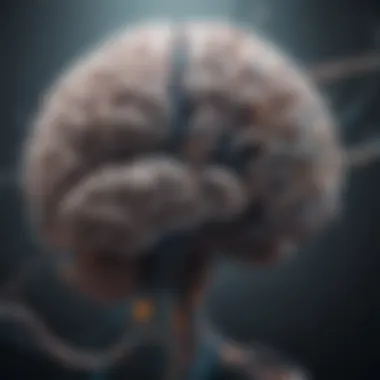Understanding the Complex Causes of Depression


Intro
Depression, often described as a shadow that lingers over one’s existence, affects millions globally. Understanding what exactly triggers this condition is not just a matter of academic interest; it's crucial for anyone trying to grapple with its complex landscape. As we embark on this exploration of the root causes of depression, it’s vital to consider various dimensions that intertwine and shape one’s mental health.
From the biological underpinnings, like neurotransmitter imbalances, to the psychological factors influenced by personal experiences and societal pressures, and even the environmental circumstances that can push one toward despair—depression is a puzzle made up of many intricate pieces.
This article aims to untangle these threads, shedding light on the multi-layered nature of depression. By diving into the latest research and insights, we aspire to provide a nuanced view that can broaden understanding and foster empathy towards those affected. The objective is not only to inform but also to enrich one's perspective on mental health, allowing for a deeper appreciation of the complexities involved.
Through this lens, we’ll uncover how intertwined these factors are and the significance of addressing them holistically when considering treatment and prevention.
Key Research Findings
Overview of Recent Discoveries
In the realm of psychological research, numerous studies have surfaced, unveiling new insights into depression’s origins. A recent meta-analysis indicates that genetic predisposition plays a more substantial role than previously thought, suggesting that individuals with a family history of depression face greater risks. Hormonal changes, particularly around puberty and menopause, have also emerged as significant triggers, emphasizing the need to focus on life stages.
Moreover, the exploration of neurotransmitter function offers valuable knowledge. For instance, a heightened understanding of how serotonin and dopamine interplay can foster more effective treatment options.
Significance of Findings in the Field
The implications of these findings extend beyond clinical environments, reaching into educational institutions and workplaces. By recognizing that depression might manifest differently based on biological markers, targeted interventions can be designed, which is invaluable for educators and employers. For example, integrating mental health education into school curriculums is invaluable; it allows early recognition and support for at-risk students.
"Recognizing depression as a multifaceted condition encourages a shift in perception from stigma to understanding."
Breakdown of Complex Concepts
Simplification of Advanced Theories
Depression is often shrouded in complex jargon, but breaking it down can make it more accessible. Cognitive Behavioral Theory (CBT) offers insight into how thought patterns affect moods. By highlighting that negative thoughts can lead to depressive cycles, one can start addressing the very root of their distress.
Another key concept is the Diathesis-Stress Model, which posits that a genetic predisposition combined with environmental stress can lead to the development of depression. This interplay is pivotal in understanding why some individuals may succumb to depression under stress while others remain resilient.
Visual Aids and Infographics
To aid in comprehension for a broader audience, diagrams that encapsulate these theories visually can be particularly helpful. An infographic depicting the interaction between genetic factors and life events in relation to depression could serve as an impactful educational tool.
Utilizing resources like Wikipedia or Britannica for further visualization and understanding could enhance the learning experience for those keen to delve deeper into these theoretical frameworks.
Understanding Depression
Understanding depression is crucial as it forms the foundation upon which we can build effective strategies for managing or treating the condition. A detailed grasp of what depression entails allows individuals—whether they are affected directly or indirectly—to recognize symptoms, appreciate the complexities involved, and approach conversations regarding mental health with thoughtfulness and empathy.
Depression is not merely feeling sad or down in the dumps; it is a multi-layered disorder characterized by persistent sadness, lack of interest or pleasure in daily activities, and a host of other physical and emotional challenges. By saying so, we emphasize the importance of viewing depression in its totality, rather than through a narrow lens. Understanding the emotional struggles can bridge gaps in communication among friends, families, and healthcare professionals.
Defining Depression
Defining depression has become increasingly necessary in discussions around mental health. It encompasses a range of emotional, psychological, and physical symptoms that hinder a person's ability to function in day-to-day life. According to the Diagnostic and Statistical Manual of Mental Disorders (DSM-5), depression is classified as a major depressive disorder when five or more specific symptoms persist for at least two weeks. This can include persistent feelings of sadness, disturbances in sleep or appetite, fatigue, difficulty concentrating, and thoughts of death or suicide.
However, defining depression goes beyond the clinical criteria. Context plays a crucial role. Cultural, socioeconomic, and individual differences can shape how depression manifests and is perceived. For instance, some might express their struggle through irritability rather than sadness, causing them to remain unnoticed or misunderstood.
Prevalence and Impact
The prevalence of depression is staggering. Research estimates that globally, more than 264 million people struggle with depression. According to the World Health Organization, nearly half of all individuals who experience a mental health issue will report depression at some stage, illustrating its widespread impact. This is not merely a statistic but a real lens into the lives of many, signifying how crucial it is to address the nuances surrounding this condition.
The impact of depression goes beyond the individual. It significantly affects families, workplaces, and communities. It can lead to lost productivity, strained relationships, and increased healthcare costs.
- For Individuals: Feelings of isolation and hopelessness can take a toll on everyday functioning, making even simple tasks seem insurmountable.
- For Families: The emotional strain may ripple, sometimes turning family members into caregivers who feel helpless or overwhelmed.
- For Workplaces: The absenteeism and presenteeism associated with untreated depression can hinder team effectiveness and overall morale.
"Mental health is just as important as physical health, but its complexities often leave many in the shadows. Recognizing depression in its varied forms is the first step toward paving the path for recovery."
Overall, understanding the root causes and subsequent impacts of depression is not just an academic pursuit; it fosters greater awareness and encourages dialogue that can spark change and ultimately lead to helping others in dealing with their struggles.
Biological Factors
Biological factors play a pivotal role in understanding depression, acting as the biological underpinning of this complex mental health condition. Recognizing the influence of genetics, neurochemistry, and hormonal changes is essential in comprehending how depression manifests and affects individuals differently. These factors not only point to the inherent vulnerabilities but also pave the way for more tailored interventions and strategies for treatment. Thus, understanding these biological dimensions becomes critical for mental health professionals, educators, and anyone seeking to grasp the multifaceted reality of depression.
Genetic Predispositions
Genetic predispositions factor significantly into depression, as they can enhance or mitigate the risk. Studies have shown that the likelihood of developing depression can be influenced by family history. For instance, having a first-degree relative with depression increases an individual’s risk—this isn't mere coincidence. Genetics might be doing the heavy lifting here. However, it is important to note that having a family history does not doom someone to experience depression; it merely signals a higher risk.
- Research suggests that some genes are linked to neurotransmitter function, impacting mood regulation.
- Variants in genes related to serotonin transport can create vulnerabilities.
However, genetics is just one piece of the puzzle. It's a bit like a double-edged sword—while inherited traits can predispose individuals to depression, environmental factors often play a crucial part as well. Understanding genetic predispositions can help clinicians develop personalized treatments emphasizing both medication and therapy tailored to a patient’s specific genetic background.
Neurochemical Imbalances


Next up are neurochemical imbalances, an area heavily researched in the field of depression. Neurologists and psychiatrists often refer to neurotransmitters—the body's chemical messengers—as key players in this drama. Critical neurotransmitters like serotonin, norepinephrine, and dopamine regulate mood, and any imbalance can spell trouble. For instance, low levels of serotonin are often blamed for the persistent sadness that characterizes depression.
Neurochemical imbalances can emerge from various factors:
- Chronic stress: This can lead to alterations in neurotransmitter levels.
- Substance abuse: Continued use can deplete the brain’s natural reserves of essential chemicals.
- Medical conditions: Certain illnesses can disrupt the complex neurochemical interactions.
"Understanding these imbalances illuminates why simply 'thinking positively' isn't always enough to lift the weight of depression."
Addressing these imbalances is crucial. Treatments like selective serotonin reuptake inhibitors (SSRIs) can help regulate those neurotransmitter levels, thus offering patients some respite.
Hormonal Influences
Finally, hormonal influences are another important biological facet in deciphering the riddle of depression. Hormones often fluctuate throughout life stages, including puberty, pregnancy, and menopause, bringing about changes in mood.
- Thyroid hormones: An underactive thyroid can mimic symptoms of depression.
- Estrogen and progesterone: These hormones greatly influence mood and emotional well-being, particularly around menstrual cycles.
- Cortisol: The so-called stress hormone; elevated levels over extended periods can usher in feelings of despair.
Individuals going through significant hormonal changes—such as pregnant women or menopausal women—may find themselves particularly vulnerable. Understanding the intricate dance of hormones can not only help in providing a better diagnosis but also guide interventions tailored to hormonal shifts.
Psychological Dynamics
Psychological dynamics play a crucial role in understanding the complexities of depression. This section delves into how cognitive patterns, personality traits, and responses to trauma and stress can shape an individual’s mental health. Recognizing these elements offers significant insight into the multi-layered nature of depression. It emphasizes the idea that mental health issues cannot be reduced to just biological factors; the psychological realm bears equal weight.
Cognitive Patterns
Cognitive patterns pertain to the ways in which people process information and their thought processes. Negative thought patterns, such as all-or-nothing thinking, catastrophizing, or overgeneralizing, can contribute to the onset and persistence of depression. For instance, a person who constantly believes they will fail at anything they attempt may avoid challenges altogether, reinforcing feelings of inadequacy. This cycle feeds depression.
Moreover, cognitive distortion often leads individuals to misinterpret situations negatively. If someone fails an exam, they might think, "I’ll never amount to anything," rather than seeing it as a setback. This reinforcing loop of negative cognitions intensifies feelings of hopelessness and despair. Cognitive-behavioral therapy (CBT) is one approach that aims to alter such destructive thought patterns, encouraging individuals to replace them with more constructive thoughts.
Personality Traits
Personality traits significantly influence susceptibility to depression. For instance, individuals who score high on neuroticism may be more inclined to experience negative emotions and mood swings. This can increase the risk of developing depression in response to life’s stressors. Conversely, traits such as resilience and openness can serve as protective factors, enabling individuals to cope better with difficult situations.
Understanding personality also involves recognizing how traits intersect with other psychological dynamics. For example, an individual with low self-esteem may react more strongly to criticism, leading to feelings of worthlessness. Thus, appreciating personality traits helps to contextualize why some individuals are more affected by depression than others.
Trauma and Stress Responses
Trauma can have a profound impact on mental health, often serving as a catalyst for depression. Events such as abuse, loss, or serious accidents can alter an individual’s mental landscape, leaving deep-seated emotional scars. The body’s stress response plays a significant role here. When faced with trauma, one might enter a state of hyperarousal or dissociation, both of which can contribute to depressive symptoms over time.
Responses to stress are also highly variable. Some individuals exhibit resilience, effectively employing coping strategies to manage their symptoms. Others may find themselves trapped in an anxiety loop, perpetually on edge and unable to find respite, leading to the development of depression.
“Understanding psychological dynamics is not just important for identifying individuals at risk for depression, it's also a pathway toward effective intervention.”
In summary, exploring psychological dynamics provides a nuanced understanding of depression. By examining cognitive patterns, personality traits, and trauma responses, we can better appreciate the intricate interplay between these factors. This perspective is essential for students, researchers, and professionals aiming to develop effective mental health interventions.
Environmental Influences
The role that environmental influences play in the onset and progression of depression is profound and multi-layered. When discussing mental health, it's vital to shift the lens beyond individual biology and psychology, as the surroundings we inhabit significantly shape our emotional landscape. These influences range from social interactions, lifestyle choices to economic conditions, creating a complex web that impacts mental well-being.
Social Context
The importance of social surroundings can't be understated. Human beings are inherently social creatures; our connections—both nourishing and toxic—have a deep impact on our psyche. Positive relationships can provide emotional support, while negative ones can be detrimental, leading to feelings of inadequacy or isolation. For instance, someone entrenched in a community of supportive friends may feel more resilient against symptoms of depression compared to an individual who feels alienated or unsupported.
Moreover, the dynamics within a family unit can shape an individual's perception of self and resilience against environmental stressors. Children raised in nurturing households often develop better coping mechanisms than those in homes where conflict and neglect are prevalent. There’s substantial research indicating that social isolation, particularly among the elderly, can spurred depressive symptoms.
"The places we belong to often shape our thoughts and feelings more than we recognize."
Lifestyle Factors
Lifestyle choices play a tremedous role when understanding depression's roots. Regular physical activity, adequate sleep, and a balanced diet are cornerstones of good mental health. Sedentary lifestyles, often punctuated by prolonged screen time, can lead to poorer mental health outcomes. The brain thrives on physical activity, which is not just about burning calories; it's also about releasing those all-important endorphins that elevate mood.
Diet is another critical player; a nutritious diet rich in Omega-3 fatty acids, vitamins, and minerals can positively influence brain function. Conversely, a diet high in processed foods could contribute to sluggishness and depressive states. Thus, cultivating healthy habits can act as a buffer against the pressures of life, maintaining levels of emotional balance.
Economic Conditions
Economic factors often intertwine with mental health, creating a pressure cooker effect. Financial instability, job insecurity, and unemployment can increase stress, prompting a downward spiral into depression. A family struggling to make ends meet may experience constant anxiety, which chips away at their psychological well-being.
Regions with limited job opportunities or high poverty rates often witness elevated levels of depression among its residents. The lack of access to quality mental health care, which frequently accompanies economic hardship, exacerbates the problem. It’s here that an understanding of how economic conditions can foster vulnerability is critical for developing holistic mental health strategies.
In summary, environmental influences encompass vast territories that play a significant role in shaping mental health outcomes. Understanding this interplay can illuminate pathways for support and intervention while fostering resilience against the often overwhelming tide of depression.
The Role of Relationships
Understanding the role of relationships is crucial in dissecting the root causes of depression. Often, mental health struggles are interwoven with the connections we maintain in our lives. Relationships, whether nurtured or neglected, can significantly influence our emotional well-being. With this section, we will explore how various types of relationships—familial, platonic, and romantic—contribute to or hinder one’s mental health.
Family Dynamics


Family is frequently the first place where we learn about relationships, emotions, and social interactions. The dynamics within a family can set the tone for individuals' mental health. First impressions matter, especially in formative years, and a stable home often provides a safety net. Unpredictable or dysfunctional family interactions, however, can lead to feelings of inadequacy and isolation.
For instance, a child growing up in a home where emotional expression is suppressed might struggle with identifying and articulating their feelings later in life. Parents who are critical may inadvertently foster a sense of low self-esteem in their children, making them more susceptible to mental health issues like depression.
Moreover, family structures are not static. Changes such as divorce, loss, or even the arrival of new family members can have profound effects. The quality of relationships between family members is pivotal. Engaging in open communication and supportive dialogues can help mitigate the distress caused by various familial challenges.
"The family is one of nature's masterpieces." – George Santayana
Peer Interactions
Friendships can provide a buffer against life's challenges. Positive peer interactions are correlated with enhanced emotional health. Friends often help us navigate stressors, providing both emotional support and practical assistance.
However, the absence of meaningful social interactions can increase vulnerability to depression. Individuals lacking a solid support system may feel isolated, leading to feelings of despair. Social media often complicates this—a platform meant for connection can sometimes exacerbate loneliness. The superficial interactions online can contribute to a sense of alienation, especially if real-life connections are sparse. In contrast, deep friendships can offer moments of joy and laughter that remind us of the bright sides of life.
Romantic Relationships
Romantic partnerships bring both joy and challenges. Love can be profoundly uplifting, yet it has the potential to unveil vulnerabilities. Couples often face pressures—financial, emotional, or social—that can test their bond.
A toxic romantic relationship can be detrimental, adding layers of stress that might precipitate depression. Conversely, a supportive partner can act as a pillar during tough times, emphasizing the importance of healthy romantic dynamics.
Establishing trust and maintaining open lines of communication can strengthen these partnerships, while neglect or disparity in effort between partners can lead to resentment and emotional distance.
Cultural Perspectives
Understanding how culture influences mental health is critical for grasping the complexities related to depression. Cultural perspectives shape not only how individuals interpret their feelings but also how they seek help and what support they perceive to be available or acceptable. When examining the roots of depression, one can’t dismiss the significant role of cultural norms, beliefs, and values. They affect stigma, treatment approaches, and even the expression of symptoms.
In many cultures, mental health issues like depression are often wrapped in deep-seated beliefs which can lead to misunderstanding and misdiagnosis. For instance, in some communities, expressing sadness might be viewed as a personal weakness rather than a legitimate health condition. This misconception can lead to reluctance in acknowledging symptoms, delaying necessary intervention.
Some cultural frameworks encourage open discussions about emotions, providing a supportive space that promotes mental wellness. Conversely, other cultures may stigmatize these discussions, pushing individuals to struggle in silence. Thus, understanding these dynamics can facilitate more effective communication about depression and improve care outcomes.
Cultural Attitudes Toward Mental Health
Cultural attitudes toward mental health are varied and complex. In Western societies, there's been a slow shift towards accepting mental health as just as crucial as physical health. However, in many parts of the world, mental health still carries stigma. For example, in some Asian cultures, concepts of face and honor can complicate discussions about mental health, leading individuals to mask depressive symptoms rather than seek help.
Individuals from cultures that prioritize collective well-being may experience depression differently. The expectation to uphold family honor or contribute positively to the community can add pressure, worsening depressive symptoms. Understanding these nuances is essential for practitioners who work with diverse populations. They must learn to navigate the cultural landscape sensitively and effectively, offering support that respects cultural contexts.
"Mental health is a universal challenge but approached differently across cultures, making understanding these perspectives vital for effective mental health strategies."
Stigma and Its Effects
Stigma plays a prominent role in shaping experiences of depression across different cultures. The fear of being labeled as 'crazy' or 'weak' can deter individuals from seeking help. Stigma can be both self-imposed and societal. Self-stigmatization might make sufferers perceive their condition as a personal failing, leading to isolation and worsening symptoms.
There are several key effects of stigma, including:
- Barriers to Seeking Help: Many avoid therapy or medication due to fear of judgment.
- Siloed Experiences: Those suffering from mental illness often feel isolated when their community does not acknowledge mental health openly, exacerbating feelings of loneliness.
- Worsened Outcomes: Not addressing mental health can lead to more severe consequences, including the risk of suicide.
Addressing stigma requires education and awareness campaigns that promote positive narratives about mental health. A culture that supports open dialogue about feelings and conditions can alleviate the burden many carry due to stigma. Therefore, creating a supportive environment is critical to helping those struggling with depression feel empowered to seek the help they need.
Co-Morbid Conditions
"Mental health is not a solitary journey; it is intertwined with various facets of our lives, underscoring the need for comprehensive care."
Key Elements of Co-Morbid Conditions
- Contribution to Severity: Co-morbid conditions can exacerbate the symptoms of depression. For example, someone suffering from severe anxiety alongside depression may experience heightened feelings of despair or hopelessness, blurring the lines of effective treatment.
- Impact on Treatment: The presence of another disorder can complicate treatment plans. A patient may be prescribed medications for both conditions, but it’s crucial to monitor how they interact, as some may amplify side effects or diminish effectiveness.
- Comorbidities' Influence on Recovery: Recovery from depression can be hindered by other conditions. If a person is also managing chronic pain or a substance dependency, their focus on treatment for depression may waver, influencing outcomes negatively.
The interplay of these co-morbid conditions can lead to a cyclical effect where one disorder feeds into another, making it difficult to break free from negative patterns. Therefore, recognizing and addressing these additional challenges is vital to not only alleviate symptoms of depression but also to promote overall mental health.
Anxiety Disorders
Anxiety disorders often walk hand-in-hand with depression. The connection between the two is so prevalent that they are frequently diagnosed together. The overactive worry that comes with anxiety can feel overwhelming and can trigger or intensify feelings of sadness or despair. Conversely, the weight of depression may increase anxiety levels, creating a harmful feedback loop. This cycle can compel individuals to engage in maladaptive coping mechanisms, further impairing their ability to manage both conditions effectively.
When evaluating treatments, healthcare providers must consider how anxiety presents itself in individuals with depression. For instance, a person with social anxiety might find it momentarily easier to cope with a major depressive episode, as their focus could shift to avoiding social situations rather than confronting their internal struggles. Thus, tailored therapies that address both anxiety and depression simultaneously—such as cognitive-behavioral therapy—can offer hope in breaking this cycle.
Substance Abuse
The relationship between depression and substance abuse is a classic example of a double-edged sword. Many individuals turn to drugs or alcohol as a form of self-medication, attempting to dull the pain of their depressive feelings. While it may offer temporary relief, such coping strategies can ultimately aggravate the symptoms of depression. Alcohol, for example, is a depressant that negatively impacts mood regulation and overall emotional well-being.
Moreover, substance abuse can complicate treatment for depression. It’s not uncommon for healthcare providers to face challenges in establishing effective treatment plans for individuals whose substance use impairs their ability to respond to typical depression therapies. This highlights the importance of integrated treatment approaches that simultaneously address both substance use and depression to foster a better chance for recovery.
Chronic Illness
Living with a chronic illness presents numerous challenges, one of which is the increased risk for depression. Conditions such as diabetes, heart disease, or arthritis can lead not only to physical discomfort but also to emotional strain. The constant management required for chronic illnesses can foster feelings of helplessness or frustration, which can spiral into depressive episodes.
Additionally, the fatigue that often accompanies chronic conditions may limit an individual's ability to engage socially or pursue enjoyable activities. This withdrawal often exacerbates feelings of isolation and despondency associated with depression. Many healthcare professionals recommend that patients receive mental health support alongside their treatment for chronic illnesses to enhance their quality of life. As treating chronic illnesses has physical ramifications, addressing the emotional aftermath is equally vital for overall well-being.


The Interplay of Factors
Understanding the interplay of factors that contribute to depression is crucial in dissecting its complex nature. This section serves as a foundational pillar in recognizing that depression is not a standalone issue but rather an intricate tapestry woven from biological, psychological, and environmental threads. Each of these elements impacts the others, creating a sequence of interactions that can exacerbate or alleviate symptoms of depression. By examining this interplay, we can unveil how these interrelated factors can shape an individual's mental health trajectory.
How Different Elements Interact
The interaction of various elements in the context of depression is akin to a finely tuned orchestra. Each factor has its own role, but it is their combined effect that shapes the overall outcome. For instance, let’s consider how genetic predispositions, stressors, and coping mechanisms operate together. An individual might inherit a genetic vulnerability to depressive disorders. However, this predisposition doesn't guarantee that one will develop depression. Environmental stressors, like traumatic life events or chronic illness, might trigger the onset of depression, particularly if the individual has limited coping resources.
- Genetic predispositions: Certain genes may create a higher risk for depression.
- Environmental stressors: Life challenges like loss, financial troubles, or societal pressures can provoke depressive episodes in predisposed individuals.
- Coping mechanisms: How a person manages stress can either mitigate or worsen depressive symptoms.
These elements can create a cyclical pattern. For example, someone experiencing chronic stress may cope poorly, leading to further mental decline. Thus, recognizing and addressing each player in this orchestra of factors is vital for effective treatment and support.
The Biopsychosocial Model
The biopsychosocial model plays a central role in understanding depression's multifaceted nature. It posits that biological, psychological, and social factors are interdependent, influencing the development and progression of mental disorders. This model moves beyond a purely biological view and encourages a comprehensive approach to treatment.
Biological Components
These include genetics, neurochemical imbalances, and medical conditions that can influence mood and behavior. For instance, a deficiency in serotonin can contribute to depressive feelings, but this doesn't mean that the person’s social life or thought patterns are unaffected.
Psychological Components
Cognitive distortions, low self-esteem, and personality traits can create a fertile ground for depression. Individuals might develop a negative outlook that colors their perceptions of events. A person experiencing repeated failures may start to see themselves as a failure, further entrenching their state of mind.
Social Components
The environment in which one operates also greatly influences mental health. Social support, peer interactions, and cultural context can either act as protective factors or risk factors. A supportive network of friends and family can act like a buoy in rough water, while isolation can deepen one’s descent into depression.
The key takeaway is that focusing solely on one area—be it biological or environmental—overlooks significant parts of the whole picture. Each aspect feeds into the others in ways that are sometimes not immediately obvious.
Current Research and Findings
Research into depression reveals a depth of understanding about its causes, treatment, and effects on individuals and society. Recent findings indicate that depression is not simply a mental state; it embodies a complex interplay of biological, psychological, and environmental factors. Such insights are pivotal for those seeking to unravel the roots of this pervasive disorder.
Understanding new discoveries in this field is crucial. It sheds light on various aspects of depression, paving the way for innovative treatment approaches, as well as enhancing the comprehension of social stigma surrounding mental health. In this section, we will explore some of the recent studies and their implications for treatment.
Emerging Studies
Emerging studies in the field of depression are broadening our understanding of how various factors converge to influence this condition. For instance, research is increasingly indicating the significance of the gut-brain axis in mental health. The relationship between gut health and mood is becoming clearer, suggesting that probiotics or dietary changes may have a positive effect on depressive symptoms.
Moreover, a fascinating area of study involves the impact of sleep patterns on mental health. Recent findings suggest that irregular sleep patterns can exacerbate depression. One study found that individuals with sleep disorders, such as insomnia, are significantly more likely to develop depressive episodes than those with regular sleep cycles.
"The interplay between sleep, gut health, and mental well-being is becoming a frontier of research that could lead to more effective interventions."
Additionally, there is a growing body of evidence linking chronic inflammation to depression. Researchers are now looking into anti-inflammatory medications as potential treatments for depressive symptoms, representing a shift in how we approach therapy.
Treatment Implications
With every new study, the implications for treatment evolve. The insights gained from current research can lead to more tailored and effective treatment plans. For instance, understanding the biochemical pathways involved in depression can facilitate the development of new pharmacological options that target these pathways specifically.
A noteworthy implication is the push towards integrating lifestyle interventions with traditional treatments. Recommendations for dietary changes, physical activity, and mindfulness practices are increasingly recognized as vital components of comprehensive care. For instance:
- Incorporating omega-3 fatty acids may enhance the efficacy of antidepressants.
- Regular physical activity has been consistently linked to improved mood.
- Mindfulness-based therapies are gaining traction in providing coping strategies for individuals.
In sum, current research and findings are not just academic exercises. They have real-world applications that can reshape how we understand and treat depression. As researchers continue to delve into this multifaceted condition, it becomes evident that tackling depression effectively requires a holistic approach, integrating both biomedical and lifestyle factors. As we synthesize these insights, the hope is that we will move towards more effective and personalized interventions that address the unique challenges faced by those living with depression.
Concluding Insights
In the exploration of depression, it becomes clear that the topic demands a nuanced understanding, weaving together various strands of biological, psychological, and environmental influences. The complexity of understanding depression lies not just in recognizing its symptoms, but in grasping how intricate these underlying causes can be. This article highlights the multifaceted nature of depression, revealing how an individual's unique background plays a pivotal role in their mental health.
The Complexity of Understanding Depression
Understanding depression is like trying to solve a jigsaw puzzle with pieces scattered everywhere. It isn't merely a result of chemical imbalances or genetic predisposition; it involves a delicate interplay of thoughts, emotions, and societal factors. We often see that people respond differently to similar stressful experiences and this varies based on personal history, resilient traits, and even social support systems.
For instance, two individuals might face similar life challenges—say, job loss—but experience diverging pathways to depression. One might find a network of friends to lean on, while another may feel isolated, lacking coping mechanisms. The social context surrounding each person, intertwined with personal resilience, greatly influences the likelihood of developing depression.
In addition, cognitive patterns, such as negative thinking or chronic overthinking, weight significantly on one's mental health. As such, treatment approaches must be holistic, addressing not just the medical aspects but also fostering psychological resilience. The roadmap to recovery needs to be tailored and should consider these diverse factors.
"Depression cannot be tackled in isolation; one must embrace its complexities and nuances to truly help those affected."
Future Directions for Research
As researchers continue to delve into the depths of depression, various promising avenues emerge. First and foremost, there is the potential to enhance our understanding of genetic research and how it interrelates with environmental stressors. New technologies such as genetic sequencing might yield insights into why certain individuals are more vulnerable.
Moreover, mental health treatments evolve as our understanding deepens. Innovative therapeutic methods, such as mindfulness-based cognitive therapy, showcase how psychological interventions can reshape harmful thought patterns, creating a more resilient mindset—and these should be evaluated rigorously to determine their long-term effectiveness.
Research into technology-driven solutions also highlights exciting possibilities. Mobile applications designed for mental health can offer real-time support for individuals, encouraging them to articulate their feelings and reflect on cognitive patterns. These tools may bridge gaps in traditional therapy, offering flexible resources tailored to individual needs.
In the coming years, it is vital for mental health research to address stigma surrounding depression. By fostering comprehensive studies that include diverse populations, we can better understand and develop culturally sensitive treatment strategies.
Throughout this exploration, the aim remains clear: to empower individuals and professionals with knowledge, fostering a deeper understanding of the intricate tapestry of depression's causes.















